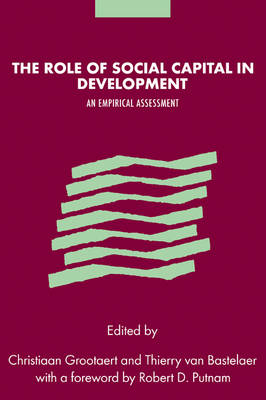
The Role of Social Capital in Development
Cambridge University Press (Verlag)
978-0-521-06579-5 (ISBN)
Previously the role of social capital - defined as the institutions and networks of relationships between people, and the associated norms and values - in programs of poverty alleviation and development has risen to considerable prominence. Although development practitioners have long suspected that social capital does affect the efficiency and quality of most development processes, this book provides the rigorous empirical results needed to confirm that impression and translate it into effective and informed policymaking. It is based on a large volume of collected data, relying equally on quantitative and qualitative research methodologies to establish approaches for measuring social capital and its impact. The book documents the pervasive role of social capital in accelerating poverty alleviation and rural development, facilitating the provision of goods and services, and easing political transition and recovery from civil conflicts.
Christiaan Grootaert is Lead Economist in the Social Development Department at the World Bank, and Manager of the Social Capital Initiative. His research centres on the measurement and analysis of poverty, risk and vulnerability, education and labour markets, child labour, and the role of institutions and social capital in development, in Africa, Asia, the Middle East and Eastern Europe. Recent publications include The Policy Analysis of Child Labor: A Comparative Study (with H. Patrinos) and Poverty and Social Assistance in Eastern Europe and the Former Soviet Union (with J. Braithwaite and B. Milanovic). He is co-author of the World Development Report 2000-2001: Attacking Poverty, and has contributed articles to various journals, including the Journal of Development Economics, Journal of Development Studies, World Development and Journal of African Economies. Thierry van Bastelaer is the Director of the Integrated Financial Services Team at the IRIS Center at the University of Maryland. As a political economist, he has designed and implemented programs in a number of areas of economic development, including policy reform for private sector growth, legal and regulatory reform for microfinance, policy priorities for electronic commerce, small enterprise development, and corruption. His research is centered around the political economy of reform, social capital and microfinance. His articles have been published in several journals, including Public Choice, and he has worked extensively in South Asia.
Foreword Robert D. Putnam; Introduction and overview Christiaan Grootaert and Thierry van Bastelaer; Part I. Social Capital at the Micro and Macro Levels: A Conceptual Discussion and Review: 1. Social capital and poverty: a microeconomic perspective Paul Collier; 2. Social capital, growth, and poverty: a survey of cross-country evidence Stephen Knack; Part II. The Impact of Social Capital on Development: 3. Mapping and measuring social capital through assessment of collective action to conserve and develop watersheds in Rajasthan, India Anirudh Krishna and Norman Uphoff; 4. Social capital and the firm: evidence from agricultural traders in Madagascar Marcel Fafchamps and Bart Minten; 5. How do participation and social capital affect community-based water projects? Evidence from central Java, Indonesia Jonathan Isham and Satu Kähkönen; 6. Does social capital increase participation in voluntary solid waste management? Evidence from Dhaka, Bangladesh Sheoli Pargal, Daniel Gilligan, and Mainul Huq; Part III. The Creation and Transformation of Social Capital: 7. The impact of development assistance on social capital: evidence from Kenya Mary Kay Gugerty and Michael Kremer; 8. Induced social capital and federations of the rural poor in the Andes Anthony J. Bebbington and Thomas F. Carroll; 9. Social capital and social cohesion: case studies from Cambodia and Rwanda Nat J. Colletta and Michelle L. Cullen; 10. Ethnicity, capital formation, and conflict: evidence from Africa Robert H. Bates and Irene Yackovlev I; 11. Measuring impact and drawing policy implications Christiaan Grootaert and Thierry van Bastelaer.
| Erscheint lt. Verlag | 19.6.2008 |
|---|---|
| Vorwort | Robert Puttnam |
| Zusatzinfo | 87 Tables, unspecified; 3 Line drawings, unspecified |
| Verlagsort | Cambridge |
| Sprache | englisch |
| Maße | 152 x 229 mm |
| Gewicht | 560 g |
| Themenwelt | Wirtschaft ► Volkswirtschaftslehre ► Ökonometrie |
| ISBN-10 | 0-521-06579-8 / 0521065798 |
| ISBN-13 | 978-0-521-06579-5 / 9780521065795 |
| Zustand | Neuware |
| Haben Sie eine Frage zum Produkt? |
aus dem Bereich


